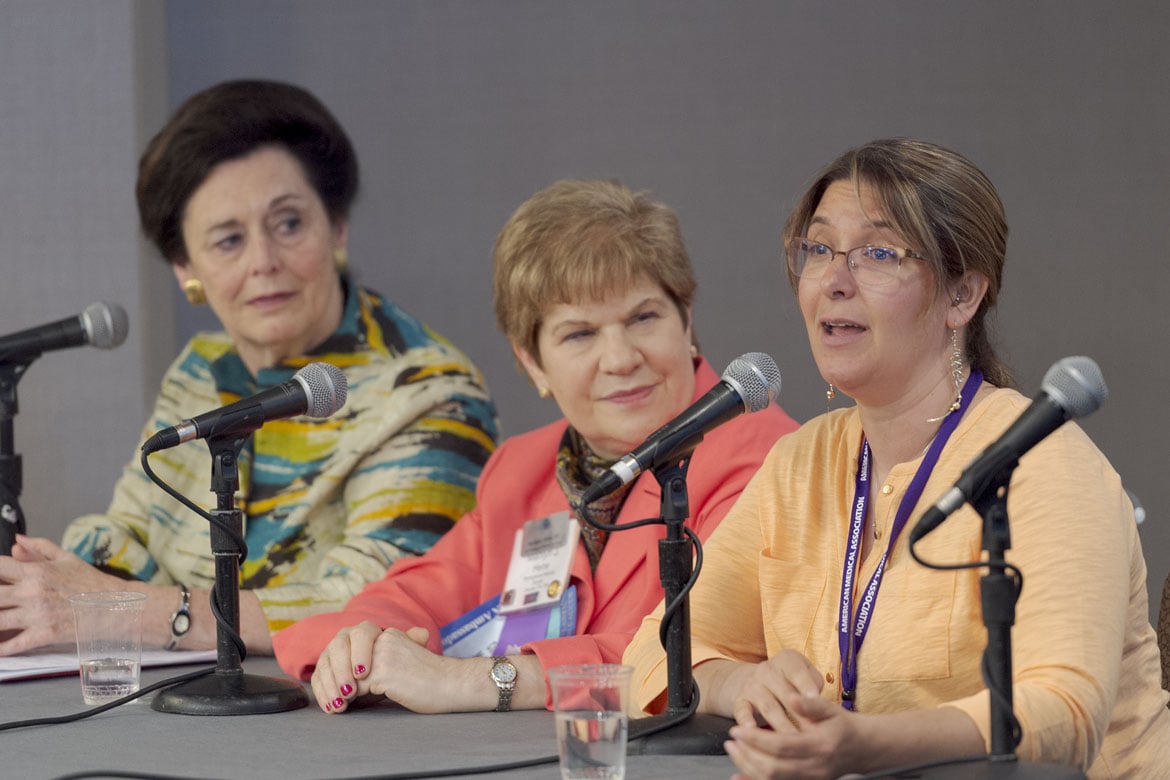For three accomplished women physicians who recently shared their experiences with fellow doctors, the evolving face of the medical field has allowed them to take on various leadership positions—but those advancements have not come without challenges.
“I found that if you just set your sights on being the best physician and contributor you could be, whether you’re male or female, eventually you will be respected and accepted,” said AMA member Donna Woodson, MD, a family physician and professor of medical education and population health at the University of Toledo College of Medicine. She also represents the Ohio State Medical Association as their Senior Delegate in the AMA House of Delegates and is a member of the AMA Women Physicians Section (AMA-WPS).
“We still have a little work to do, but I think that we’re headed in the right direction,” she added.
AMA members Joanna Bisgrove, MD, and Marilyn Heine, MD, joined Dr. Woodson during the education session on women leaders in medicine, held during the 2019 AMA Annual Meeting in Chicago. (Drs. Woodson, Heine and Bisgrove are pictured above.)
Each physician offered her advice for other women in medicine looking to take on leadership roles. This September, the AMA is marking Women in Medicine Month by celebrating trailblazers, advocates and leaders.
Pursue different outlets
There are a variety of avenues that women physicians can take to become leaders in medicine. For example, joining their state medical society or their medical specialty society.
“There are always opportunities. And if you speak up and express interest and show that you’re really willing and interested to work and to be a real contributor, then you will be asked to continue to do different things,” said Dr. Heine, a clinical assistant professor in the Department of Medicine at Drexel University College of Medicine in Philadelphia, and a hematology-oncology and emergency physician in southeast Pennsylvania.
She is also vice chair of the AMA Council on Legislation, a Steering Committee member of the AMA Ambassador program, and an AMA delegate representing the Pennsylvania Medical Society.
“It's really important to express your message clearly, to show your enthusiasm and to connect with others to show that you're genuinely interested in actually having a part in what goes on,” she added. “If you look around, you can always see that there are opportunities.”
Invest in your passion
When looking at involvement in organized medicine, Dr. Woodson recommends finding “another area that is your passion and investing yourself in that.” For her, it became public health. She has led her regional health department board for 16 years and testifies at AMA reference committee hearings on those topics.
One area for physicians to stand tall is by joining the AMA, she said, adding that this creates an opportunity for everyone to share their commitment to medicine. This engagement leads “to doing more and people recognizing your abilities and your enthusiasm.
“They’re not just regular friends that you grew up with in the neighborhood. These are friends who share similar passions in the profession that is like no other,” said Dr. Woodson.
Be present and keep learning
The first rule of leadership is to “show up,” said Dr. Bisgrove, a family physician at SSM Health-Dean Medical Group, which is headquartered in Madison, Wisconsin. “That’s huge. You can’t be involved in leadership if you’re not there,” added Dr. Bisgrove, an at-large member of the WPS Governing Council and a delegate for the American Academy of Family Physicians.
Another important tip she offered is to “always be a sponge—always be learning. … Everyone comes from different experiences, has different backgrounds.”
“Learn from people who have been in the [AMA House of Delegates] for a long time. People who have been in practice, physician residents, anyone around you,” said Dr. Bisgrove, adding that “it's amazing what you can learn and may think not just about policy, but about indirect human interactions and about strategy.”
To be a leader, physicians should also always be willing to volunteer because “if you help people out, you never know when that will come back to help you.”
“If you always try to be the one involved, engaged and helpful, it only makes people like you and respect you,” Dr. Bisgrove said. “And when that time comes around when you need help, there are a lot more willing to stand up for you, just as you stood up for them.”




